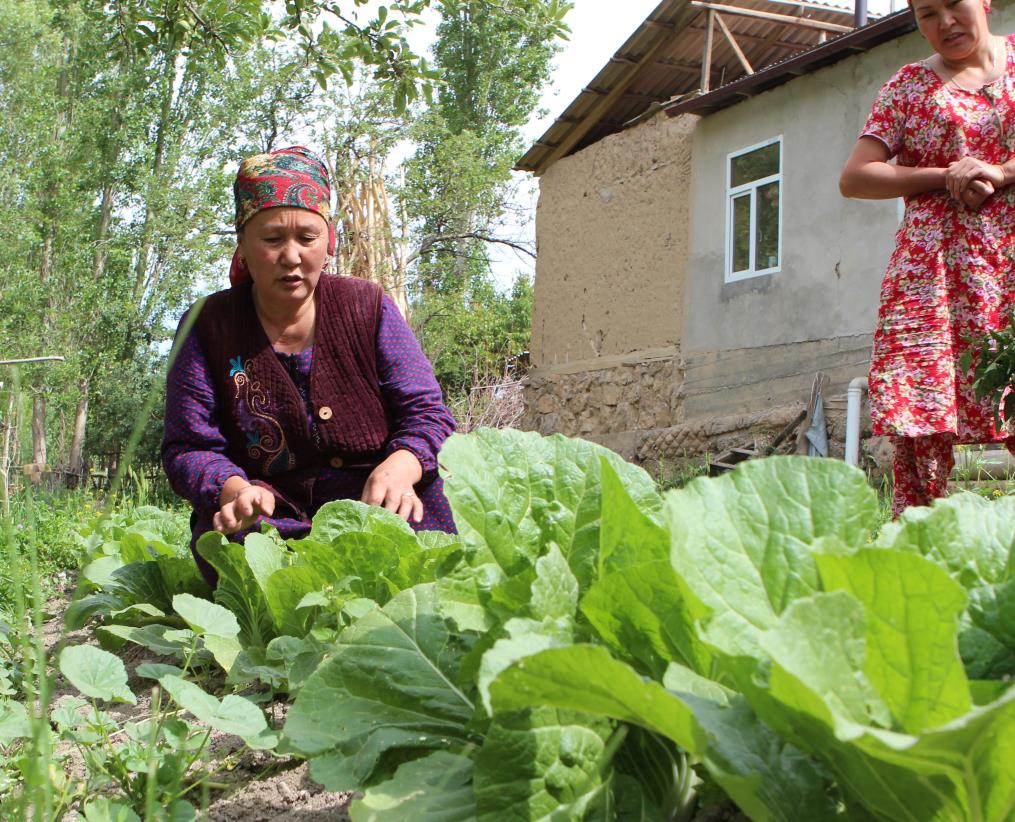
Kyrgyz farmers learn managing multiple risks in agriculture and the food system
During the COVID-19 crises, 1 140 families have been supported by FAO with vegetable seeds and professional advice
©FAO/Karina Abdyldaeva
17/12/2020
In recent years, residents of remote areas in south Kyrgyzstan have been facing a host of challenges and difficulties, including two interrelated major issues – migration and weather extremes. Through cooperation and with knowledge from FAO, they are managing to get back on track despite devastating mudslides.
Despite the hot and dry climate, Kyrgyzstan’s Batken region is famous for its delicious vegetables, rice, apricots, and peaches, and for the hardworking people living there. Most of them work in agriculture for a living, fighting the vagaries of nature: sudden frosts, heavy rains, and destructive mudslides.
One of them is Karamat Omurbayeva, who lives with her family in a small village called Aikol in the Batken region, that was caught off guard by a mudslide in the spring. The heavy rainfall washed away everything she planted in the garden, along with a small greenhouse and her hope for a good harvest. The heavy rains went on for several days and the mudslide took away crops and destroyed houses and buildings in the whole region, threatening the food security and survival of hundreds of families.
“I was lost and didn't know if I would find a way out. My husband remained in Russia in migration, because of the closure of the borders, so his arrival back home was impossible, just as his ability to earn money in a foreign country,” remembers Karamat Omurbayeva. “We had only the small social benefit that my mother-in-law revives from the government, but unfortunately that amount is too small to feed three children and two adults.”
During the COVID-19 crises, 1 140 families, including hers, have been supported by FAO with vegetable seeds and professional advice from an agronomist.


©FAO/Karina Abdyldaeva
At the consultations, villagers learned to prepare organic fertilizers, such as compost and biohumus, apply them correctly, and deal with plant pests and diseases, as well as differentiate between hybrid and varietal seeds. Families receive enriched vegetable oil and fortified flour from the World Food Programme, a partner of the project, in addition to participation in the agricultural training.
Moreover, people in Aikol were forming groups of mutual assistance to participate in agricultural initiatives and projects and grow their crops together, and improve them.
Neighbours from the village tried to help Karamat's family, too, by giving flour, butter, and other foods. She learned about this project, entitled “Climate action in Kyrgyzstan,” from one of the villagers and used the opportunity to help her family overcome a difficult period and improve yields.
Karamat has been engaged in agriculture her entire lifetime, and yet, the consultations were beneficial even for her.
“The agronomist taught us simple things that we did not know and had not used for so many years of working in gardens and orchards,” told Kamarat. “If we used to throw leaves from trees, now we have learned to collect them and make compost – natural fertilizers for our soil. And, together with my aunt Alima, now we grow tomatoes, cucumbers, cabbage, beets, and some greens in our two gardens.”

©FAO/Karina Abdyldaeva
Because of the high level of unemployment and socio-economic problems in the region, both young men and women migrate abroad for jobs. That flow of labour migrants continues to grow, also as a result of climate change. Thus any support that helps people retain a secure livelihood contributes to resilient and more prosperous rural areas and a better overall future for those who produce the food we eat.
The project runs through December 2020. It is financed from FAO’s Multidisciplinary Fund, which is part of the Organization’s Programme of Work and Budget for 2018–19. It finances initiatives that strengthen collaboration across disciplines and organizational boundaries, and facilitates innovative measures for increased efficiency and effectiveness in delivering FAO’s Regional Initiatives and overarching priorities at country level.
Related links
Read more
